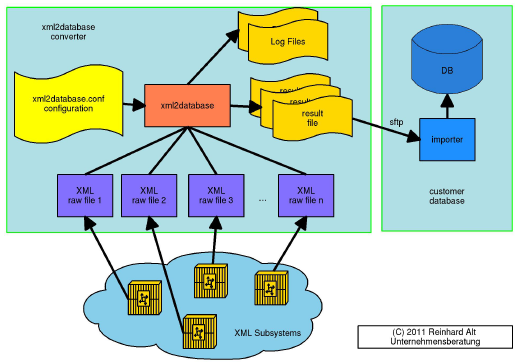
| ||||||||||||||||
|
xml2database
xml2database is a flexible, configurable and powerful converter very large amounts (>GByte) of XML data for fast import into databases. A dynamic configuration language allows fast adaption of counters and measurements mapped to database tables. Changes in the naming of XML attributes can be captured within the converter, so that a once-established database tables does not need to be changed if an attribute name has changed on the XML-generating subsystem. This saves money and your time! You have tested the demo version and would like to purchase a production version of the software or need adjustments, tests at on your reference system or modification configuration files for your individual database tables? We like to help you: 
Free demo software/documentation download:Linux Version X86:OpenSolaris 10 / X86 - distributions Paket: xml2database-OpenSolaris-V0.8.1.tar.gz OpenSolaris 10 / X86 - demo binary only: xml2database-OpenSolaris-V0.8.1-demo linux / X86 - distributions Paket: xml2database-linux-V0.8.1.tar.gz linux / X86 - demo binary only: xml2database-linux-V0.8.1-demo Handbook: xml2database_user_handbook.pdf Used technologies:
Available platforms:
Installation
Test run
Example configuration:
#
# Software testing
#
INPUTFILE "^TESTDATA.*\.xml$" { # data source
GENERATES MEASUREMENT {
MEASUREMENTNAME "DEVELOPMENT_TEST1" # name of the measurement
GRANULARITY 15MIN # "15MIN" -> "Q"
# "24H" -> "D"
# "EVENT" -> "E"
MATCH {
NEEDS "datarecord"->"shell"
}
COLUMNS {
UTC_FILESTAMP "UTCTIME" # UTC from filename
REGEXPATTRIBUTE( "Port", "Port ([0-9]*)/[0-9]*/[0-9]*" ) "Shelf" # extract shelf
REGEXPATTRIBUTE( "Port", "Port [0-9]*/([0-9]*)/[0-9]*" ) "Slot" # extract slot
REGEXPATTRIBUTE( "Port", "Port [0-9]*/[0-9]*/([0-9]*)" ) "Port" # extract port
CONVERTATTRIBUTE MS_TO_UTC( "timeCaptured" ) "UTCTIME1" # UTC time from milliseconds
CONVERTATTRIBUTE MS_TO_LOCAL( "timeCaptured" ) "LTIME1" # localtime from milliseconds
CONVERTATTRIBUTE STRING_TO_UTC( "StartTime",
"yyyy'-'MM'-'dd'T'hh':'mm':'ss'Z'" ) "ISO_UTC_TIME" # UTC time
CONVERTATTRIBUTE STRING_TO_LOCAL( "StartTime",
"yyyy'-'MM'-'dd'T'hh':'mm':'ss'Z'" ) "ISO_LOCAL_TIME" # local time
ATTRIBUTE( "receivedTotalOctets" ) "RECEIVED" #
ATTRIBUTE( "transmittedTotalOctets" ) "TRANSMITTED" #
BOOLATTRIBUTE( "bits"->"subattribute", "active" ) "IS_ACTIVE" # 1 = if "active" else 0
ARGATTRIBUTE( "attributeWithArgs", "arg1" ) "ARGATTR1"
ARGATTRIBUTE( "attributeWithArgs", "arg3" ) "ARGATTR3"
}
}
GENERATES MEASUREMENT {
MEASUREMENTNAME "DEVELOPMENT_TEST2" # Name der Messung
GRANULARITY 24H # "15MIN" -> "Q"
# "24H" -> "D"
# "EVENT" -> "E"
MATCH {
NEEDS "data"->"shell"->"bits"
}
COLUMNS {
UTC_FILESTAMP "UTCTIME" # UTC from filename
REGEXPATTRIBUTE( "Port", "Port ([0-9]*)/[0-9]*/[0-9]*" ) "Shelf" # extract shelf
REGEXPATTRIBUTE( "Port", "Port [0-9]*/([0-9]*)/[0-9]*" ) "Slot" # extract slot
REGEXPATTRIBUTE( "Port", "Port [0-9]*/[0-9]*/([0-9]*)" ) "Port" # extract port
CONVERTATTRIBUTE MS_TO_UTC( "timeCaptured" ) "UTCTIME1" # UTC time from milliseconds
CONVERTATTRIBUTE MS_TO_LOCAL( "timeCaptured" ) "LTIME1" # localtime from milliseconds
CONVERTATTRIBUTE STRING_TO_UTC ( "ISO8601TIME",
"yyyy'-'MM'-'dd'T'hh':'mm':'ss'Z'" ) "ISO_UTC_TIME" # UTC
CONVERTATTRIBUTE STRING_TO_LOCAL( "ISO8601TIME",
"yyyy'-'MM'-'dd'T'hh':'mm':'ss'Z'" ) "ISO_LOCAL_TIME" # localtime
BOOLATTRIBUTE( "bits"->"subattribute", "active" ) "IS_ACTIVE" # 1 = if "active" else 0
ATTRIBUTE( "transmittedTotalOctets" ) "TRANSMITTED" #
ATTRIBUTE( "receivedTotalOctets" ) "RECEIVED" #
}
}
}
|
|||||||||||||||

